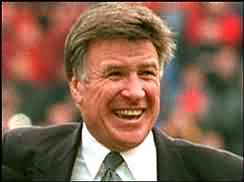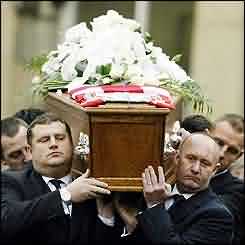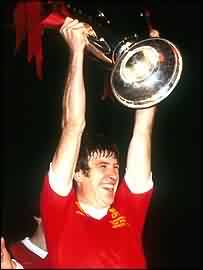| |

Emlyn Hughes
(1947-2004)
NOVEMBER 17
Football bids farewell to Hughes
BBC Sport Online
Hundreds of former players and fans gathered on Wednesday
at Sheffield Cathedral for the funeral of ex-England and
Liverpool captain Emlyn Hughes.
 The
Cathedral itself was packed to its 1,700 capacity with
hundreds of mourners standing in the rain outside. The
Cathedral itself was packed to its 1,700 capacity with
hundreds of mourners standing in the rain outside.
Liverpool greats John Toshack, David Johnson, Jimmy Case,
Kevin Keegan, Ron Yates, Ian St John and Brian Hall were all
present at the 12 noon service.
Hughes died of a brain tumour at his Sheffield home on 9
November, aged 57.
The service was led by The Dean of Sheffield, Very Reverend
Peter Bradley.
Reverend Bill Bygroves, chaplain of Liverpool Football Club,
offered condolences from the club and its fans.
The Archdeacon of Doncaster, Bob Fitzharris, gave a short
homily.
New Wales manager Toshack paid tribute to Hughes in a reading
during the service.
He said: " Emlyn epitomised what the club was all about in
those heady days with Bill Shankly and then, later on, Bob
Paisley.
"He was full of enthusiasm, a bubbly character who motivated
his team-mates by his own example as much as anything else.
"Whatever the weather he would be first out onto the training
ground and last to come in."
Two of Hughes' favourite hymns, Amazing Grace and I Vow to
Thee My Country, were played at the service.
Liverpool chairman David Moores, chief executive Rick Parry,
and former chief executive Peter Robinson, who was in charge
of the club when Shankly bought Hughes from Blackpool, were
also in attendance.
Other ex-Reds players at the service included Kenny Dalglish,
Alan Kennedy, Phil Neal and current Newcastle manager Graeme
Souness, while Coventry boss Peter Reid was also present.
Neal, who won the European Cup in 1977 and 78 with Hughes,
told the BBC: "It was a fitting tribute for a terrific man.
Emlyn was a great ambassador - he played with a smile and a
competitive edge and he was a great captain."
Dignitaries from the world of football included former top
referee Keith Hackett, who was there along with ex-Manchester
City player and manager Tony Book, former Sheffield Wednesday
manger Danny Wilson, and players Carlton Palmer and Peter
Eustace.
The 45-minute service ended with a rendition of Liverpool
anthem You'll Never Walk Alone sung by the Cathedral choir.
NOVEMBER 9
How the
Crazy Horse won a place in history
Chris Bascombe looks back at the life of LFC legend Emlyn
Hughes, who has lost his long battle against cancer -
Liverpool Echo
You know who I've got in the back of this car, son? The
future Liverpool and England captain.'
Bill Shankly's now infamous quip to a policeman in 1967, hours
after signing 19-year-old Emlyn Hughes, could have been
another example of his comic exaggeration.
Instead, it proved to be the legendary Scot's most accurate
prophecy.
From the moment he saw Hughes, Shankly knew he'd bought a Kop
idol. The Scot's excitement was matched by the fans when
Hughes made his Liverpool debut against Stoke on March 4 1967.
No player could have embodied Shankly's footballing philosophy
more than the enthusiastic Lancastrian, signed from Blackpool
for a paltry £65,000.
Yet it's not beyond the realms of possibility Hughes could
have ended up skippering Wales, not at football, but Rugby
League.
Emlyn's father, Fred, made his name as a master of the oval
ball and only left the valleys towards the end of his career.
He moved his family to Barrow-in-Furness where Emlyn was born
on August 28 1947.
From an early age, it became obvious it was football, not
rugby, which would be Emlyn's passion.
He signed apprentice terms for Blackpool as a schoolboy and
played just a handful of first team games when Shankly made
his first bid, which was rejected. Shankly refused to give up
and eventually got his man.
Whatever Hughes' reputation since he left Anfield - and it's
fair to say he developed a love him or loathe image in latter
years - Emlyn the player never let the club down.
Four league titles, two European Cups, an FA Cup and two UEFA
Cups made him one of the most decorated players in English
history.
He completed the set of domestic honours by winning the League
Cup with Wolves in 1980, an honour which eluded him at
Anfield.
Perhaps the biggest tribute to his ability came when he was
named the Football Writers player of the year in 1977, when
Liverpool only missed out on the treble by losing the FA Cup
final.
Think of the greats in that first European Cup winning side.
Kevin Keegan, Tommy Smith, Ian Callaghan and Ray Clemence.
Hughes was an inspiration.
His ecstasy, so visible in that broad smile as he lifted
the giant trophy in Rome in 1977, perfectly embodied the
feelings of thousands of Kopites.
In an age when stars are criticised for not giving 100%, this
was one flaw Hughes never possessed during his 665 games for
Liverpool.
His nickname 'Crazy Horse' aptly described his style.
"You ain't seen nothin' like the Mighty Emlyn," The Kop would
sing.
Shankly had to tell his rookie defender to calm down, fearing
he'd burn too much energy in his relentless pursuit of the
ball.
Finding the right role for this jack-in-the-box was Shankly's
first task. Left back and midfield were his favoured positions
in the early years. He could play anywhere, in many respects
one of those rare 'complete' footballers..
Eventually, he settled down as an elegant centre-half. The era
of Alan Hansen and Mark Lawrenson is often considered as the
beginning of Anfield's cultured play from the back.
Hughes and Phil Thompson could argue otherwise as they showed
defenders could pass as much as tackle.
Hughes was an extraordinarily successful skipper, scoring 48
goals during his time on Merseyside and winning 59 England
caps while at Anfield, a Liverpool record matched only
recently by Michael Owen.
He won 62 caps in all and was awarded an OBE in 1980.
Soon after he left Liverpool in 1979, Hughes' achievements on
the field started to become overshadowed by public spats with
his former team mates.
Tommy Smith and Hughes never got on when they were at the
club, and the war of words continued for two decades.
Hughes notoriously sang an anti-Everton song during
Liverpool's European Cup celebrations in 1977, something which
embarrassed team mates.
And after he'd left Anfield, a newspaper column in which he
was quoted saying Brian Clough was a better manager than Bob
Paisley further inflamed tensions between Hughes and those who
once loved him on The Kop.
Perhaps Emlyn was misquoted or misinterpreted. Maybe he was
misguided. But at public functions his ferocious passion
quickly won back the respect of the Liverpool fans who'd been
annoyed at some of his less favourable remarks.
After leaving Anfield for Molineux, a stint as
player-manager at Rotherham never worked out, but he settled
in Yorkshire after he quit football.
Later generations knew Hughes more as an outspoken pundit and
regular captain on the BBC's 'Question of Sport'.
Sadly, he wasn't such a regular visitor to Anfield in latter
years, even though his contribution to the Liverpool success
story stands alongside any legendary figure.
Perhaps Emlyn was too outspoken for his own good, but as he
said at last year's ECHO tribute dinner in honour of the 1977
European Cup winners, he would never stop loving Liverpool.
That's why, even though he was seriously ill, he was
determined to join celebrations.
Great Liverpudlians are judged on their actions rather than
words, and Emlyn's performances will never be forgotten by
those who witnessed them.
As the man who lifted the European Cup for Liverpool for the
first time, his place within Anfield's Hall of Fame is well
preserved.
Just as Shankly had predicted.
NOVEMBER 9
Football pays tribute to Hughes
BBC Sport Online
Friends and former Liverpool players have paid tribute to
Emlyn Hughes, who has died from a brain tumour aged 57.
 Former
Reds captain and manager Graeme Souness told BBC Radio Five
Live: "He was an absolute legend. When I went to Liverpool he
was the main man. Former
Reds captain and manager Graeme Souness told BBC Radio Five
Live: "He was an absolute legend. When I went to Liverpool he
was the main man.
"He was a wonderful player and a fantastic example to
everyone. He was the best person to learn from and a larger
than life character.
"Football will definitely miss him - he was a legend."
Former Liverpool and England goalkeeper Ray Clemence said: "We
still have the old boys' association, we still have that
closeness.
"It's a very sad day, one of the greats of a great Liverpool
side is no longer with us.
Phil Neal told BBC Radio Five Live Hughes was an
inspirational figure in the club's success in the 1970s and
80s.
"His character rubbed off on us all. I came in as an
inexperienced player and he was so effervescent," he said.
"He used to drive me on a Friday to meet up with the team bus
for an away game and he would convince me we would win 2-0 -
just like Shankly would have done. He never dreamt of losing
any game."
Former Reds midfielder Terry McDermott remembers Hughes as
a "bundle of joy".
"He absolutely adored playing football. He would just give
110%," he said.
"They called him Crazy Horse and that's exactly what he was.
He never stopped, he was up and down the pitch, cajoling
everyone. He'll not be forgotten."
John Toshack, who made his name as a Liverpool striker in
the 1970s, told BBC Radio Five Live that Hughes would have
played an outstanding role in any dressing room.
"I have been in management for 25 years and all over Europe. I
would have been very pleased to have had Emlyn in any of my
squads.
"In our Liverpool days, if you were feeling low on confidence,
you needed a player like him in your side. The bigger the
game, the better he was."
BBC Sport's Mark Lawrenson said Hughes, who captained
England 23 times and won two European Cups and four league
titles with Liverpool, was one of the sport's true greats.
He said: "He was a really great player, quite obviously,
because otherwise you wouldn't win so many caps for England.
"He was also larger than life - a fantastic person to go to
the races with because he knew everyone."
Liverpool Football Club, who will hold a minute's silence
in honour of Hughes before the Carling Cup tie against
Middlesbrough at Anfield on Wednesday, paid their tribute in a
statement on their website.
"Those lucky enough to see him play will recall his boundless
enthusiasm, 100% commitment and unrelenting passion for the
club whenever he had the Liver Bird close to his chest.
"Signed in 1967 by Bill Shankly, he was to be one of the most
inspirational signings this club ever made."
Chief executive Rick Parry said: "Our deepest sympathies go
out to wife Barbara, children Emma and Emlyn junior, and the
rest of the family at this sad time."
Hughes, who also played for Blackpool, Wolves, Hull, Mansfield
and Swansea, went on to make his mark in television as a
captain on the BBC's A Question of Sport quiz show.
His rival captain Bill Beaumont, the former England rugby
union captain, said: "He had an infectious laugh, wasn't
afraid to laugh at himself and was a great team man."
And football fans have been paying their tributes to Hughes on
the 606 message boards.
Graham McCann spoke for all Liverpool and Wolves fans when
he said: "In infants school, I got my mum to sew a number six
on the back of my tiny red footie shirt.
"You didn't need to pay for the name in those days. Everyone
knew whose shirt it was meant to be."
But Hughes was not just popular with Liverpool and Wolves
fans, as one un-named fan highlighted:
The fan said: "Not just a loss to Liverpool, or even England,
but a great loss to football.
"One of those players who everyone admired, one of those few
people on TV who everyone enjoyed."
NOVEMBER 9
Football great Emlyn Hughes dies
BBC Sport Online
Former England and Liverpool captain Emlyn Hughes has died
from a brain tumour at the age of 57.
Hughes earned 62 caps for the national team and led Liverpool
to a string of honours while at the Anfield club.
He helped the club to four league titles, two European Cups,
an FA Cup victory and two Uefa Cup titles.
Hughes was the first player to lift the European Cup for
Liverpool after the victory over Borussia Moenchengladbach in
1977.
He was awarded an OBE in 1980 for his services to sport and
the larger than life personality was nicknamed Crazy Horse.
Hughes was a midfielder who converted to centre-back and was
signed for Liverpool by Bill Shankly for £65,000 from
Blackpool in 1967.
He left Liverpool for Wolves in 1979 for £90,000 and also went
on to play for Rotherham, Hull City, Mansfield Town and
Swansea City.
The legendary player won the Football Writers' Player of the
Year in 1977 and completed his full set of domestic honours
when he won the League Cup with Wolves in 1980.
Hughes had been battling a brain tumour for the last 15 months
but his condition deteriorated in the last few days.
His wife Barbara said: "He died at his home in Sheffield with
his family around him."
He was also known for his role as a team captain on the BBC
quiz show A Question of Sport.
Liverpool will hold a minute's silence in rememberance of
Hughes before their Carling Cup match against Middlesbrough on
Wednesday.
"Those lucky enough to see him play will recall his boundless
enthusiasm, 100% commitment to the cause and unrelenting
passion for the club whenever he had the Liver Bird close to
his chest," Liverpool said on their website.
"He was to be one of the most inspirational signings this club
ever made and in a glittering career with the Reds he won
almost every honour in the game.
"He will be sadly missed by all."
Liverpool chief executive Rick Parry added: "Our deepest
sympathies go out to wife Barbara, children Emma and Emlyn
junior, and the rest of the family at this sad time."
Emlyn
Hughes factfile
1947: Born August 28 in Barrow-in-Furness, the son of former
Barrow and England rugby league player Fred Hughes.
1967: Signed professional terms with Blackpool.
After just 31 league and cup appearances for the Seasiders,
Liverpool manager Bill Shankly signed him for £65,000, aged
just 19.
1970: April 19 - Won the first of his 62 England caps in a 1-1
draw with Wales in Cardiff. Included in the squad for the 1970
World Cup in Mexico but does not play in the finals.
1973: First career silverware as Liverpool win the league and
the Uefa Cup.
1974: Liverpool win the FA Cup, beating Newcastle 3-0 at
Wembley.
1976: More glory for the Reds as they win a league and Uefa
Cup double for the second time in three years.
1977: Liverpool retain their league title and win the European
Cup for the first time, beating Borussia Monchengladbach 3-1
in Rome. Named Football Writers' Player of the Year.
1978: Bob Paisley's team win back-to-back European Cups, this
time beating FC Brugge 1-0 at Wembley.
1979: Secured last career league title. Joined Wolves for
£90,000.
Worked on BBC quiz show A Question of Sport as a team captain
alongside rugby union star Gareth Edwards.
1980: Won the League Cup with Wolves, completing a full set of
domestic trophies. Won the last of his 62 England caps as a
substitute against Scotland, having captained his country 23
times.
Worked as a player-manager at Rotherham while also playing for
Hull, Mansfield and Swansea before winding up his playing
career.
1984: Returned to Question of Sport as a captain opposite
former England rugby union captain Bill Beaumont, in a popular
double act which ran for five series.
2004: April - Hughes, who had already undergone surgery to
have a brain tumour removed, attends Aintree on Grand National
day, with the horse he part-owned, Mantles Prince, in the
race. The outsider pulled up at the 16th fence.
November 9 - Hughes dies of a brain tumour aged 57.
|